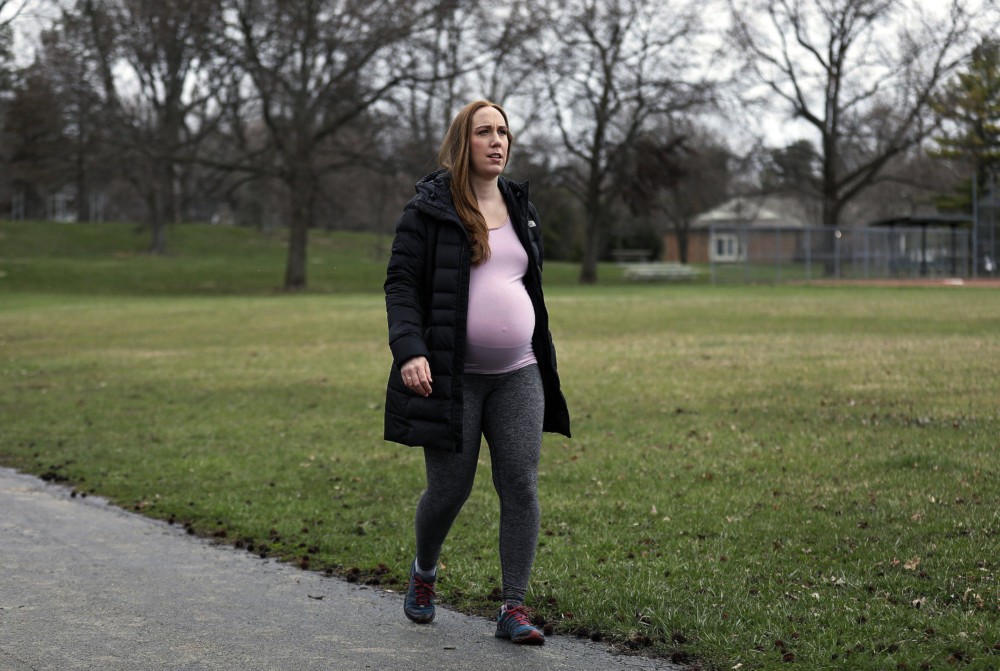By Danae King
The Columbus Dispatch
WWR Article Summary (tl;dr) Giving birth can be a scary thing in the best of times, for some women right now, the fear is exponential.
Columbus
Lauren Castillo started getting nervous when she and her husband got home from their “babymoon” in early March.
Castillo, 33, and her husband, Vince, 36, went to West Virginia for a few days before her April 27 due date. But when they got back, the two realized that things with COVID-19 were escalating quickly, with the number of those getting ill growing exponentially every day.
They decided they had to figure out a game plan to keep their unborn baby safe from the coronavirus.
“Being pregnant, it just adds a whole other layer to think about,” Lauren Castillo said.
Castillo is one of many expectant mothers in central Ohio who are fearful about what the coronavirus could mean for their pregnancies and newborn babies, and doctors don’t have a lot of answers for them as of yet.
The virus is so young that there has been little research on how it impacts pregnancies, say local doctors, though the small amount of research that has been done appears promising.
“We’re really reassuring our patients that although these reports are small, they’re reassuring,” said Dr. Michael Cackovic, a maternal fetal medicine physician at Ohio State University’s Wexner Medical Center.
The reports come from China, where the virus first appeared in late December.
Pregnant women, by the very nature of their condition, already have mildly compromised immune systems, Cackovic said. And sometimes they also have respiratory complications related to carrying a baby, as the extra weight might push against their chest.
But the virus doesn’t seem to affect pregnant women any more harshly than other healthy individuals, said Dr. Jason Melillo, OhioHealth’s medical director of women’s health and OB-GYN at Avina Women’s Care, a private practice with several central Ohio locations.
The recommendations for staying healthy are much the same for pregnant women as they are for women of childbearing age who are not pregnant, Cackovic said.
He recommends limiting in-person prenatal care to visits that are absolutely needed and doing others through telemedicine to limit contact and potential exposure to the virus.
“We’re telling patients to proceed with an abundance of caution,” Melillo said.
Over the past several weeks, Castillo has looked forward to her doctors’ appointments because they have been the only opportunity she’s had to leave her Upper Arlington home, other than the occasional walk when the weather is clear.
One of the first things she and her husband did in early March was buy everything they still needed off their baby registry. The couple had a shower in February in California but still needed some basics like bottles.
“We were just thinking through backup backup plans for the baby,” Castillo said. “I think we’re not worried as much about ourselves … Really the focus was on the baby and what we needed to do for the baby.”
Early on, Castillo stopped going to the prenatal yoga classes that she treasured, for safety reasons. Then, weekend activities such as birthday parties and cooking classes began to be canceled as the coronavirus outbreak escalated in Ohio and Gov. Mike DeWine began cautioning people to postpone group activities.
Despite it all, Castillo finds comfort in knowing that nothing will change in the maternity ward at Wexner Medical Center, where she plans to deliver, according to her doctor.
“They’ll keep that floor isolated,” she said.
Melillo said the hospitals are taking every precaution to make sure patients are safe.
“The hospitals are still safe,” he said.
Pregnant women are limited to one healthy visitor while they’re at an OhioHealth hospital for the delivery, Melillo said, and the health system has cut down on the back-and-forth that usually happens with babies going to the nursery or for tests. Instead, they stay in the room with their moms, he said.
Castillo does worry about how the virus could affect her newborn daughter after she’s born and before her immune system is developed.
“I think for the most part, the fear is (of) the unknown, because I think as a world we don’t know a lot about this, which creates fear and anxiety,” Castillo said.
Rebecca Karnes, 28, of Grove City, is about 17 weeks pregnant and also fearful because there isn’t enough data out there about how the virus can affect a pregnancy or whether babies could be impacted if moms get the virus.
So far, there’s no evidence that a woman can transmit the virus to her baby in utero, Cackovic said. But if a woman has the virus during delivery, it is recommended that she is isolated from the baby for 14 days following delivery, he said. Because the virus hasn’t been found in women’s breast milk, the mother can still pump for the baby, Cackovic said.
“I worry about any harm it could cause, even miscarriage or stillbirth. Possible birth defects,” Karnes said in an email to The Dispatch. “The unknown is absolutely terrifying.”
Melillo said the most important thing for pregnant women is to not panic.
“Pregnancy, especially for a first-time mom, is anxiety-inducing all by itself,” he said. “There are 1,500 OB-GYNs in this city and numerous more around the world that are trying to answer all the questions.”
___
Distributed by Tribune Content Agency, LLC.














































































































































































































































































































































































